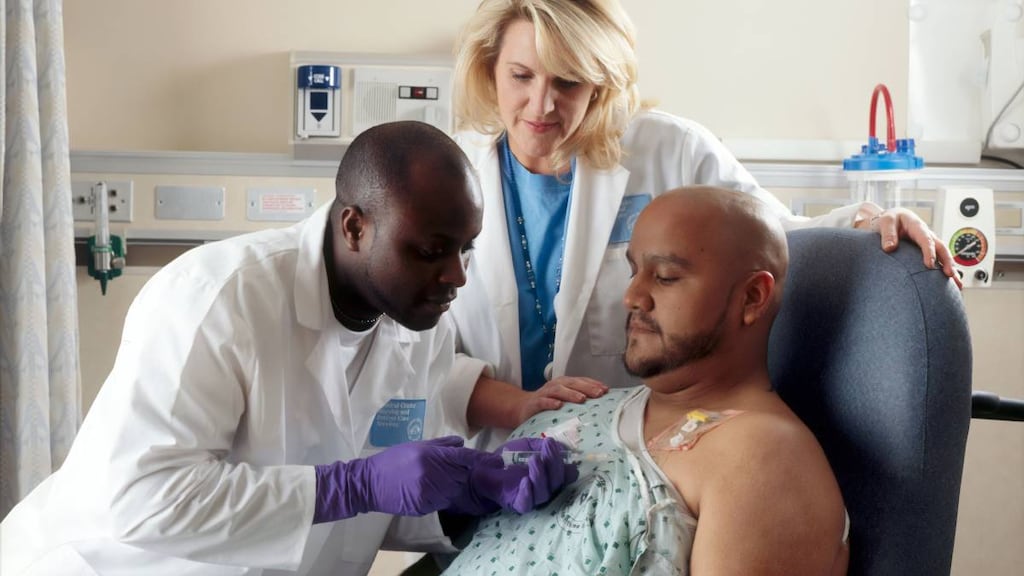What is Delestrogen?
Delestrogen is a medicine that contains estrogen hormones.
What is Delestrogen used for?
Delestrogen is used after menopause to:
- reduce moderate to severe hot flashes. Estrogens are hormones made by a woman's ovaries. The ovaries normally stop making estrogens when a woman is between 45 to 55 years old. This drop in body estrogen levels causes the "change of life" or menopause (the end of monthly menstrual periods). Sometimes, both ovaries are removed during an operation before natural menopause takes place. The sudden drop in estrogen levels causes "surgical menopause."
When the estrogen levels begin dropping, some women develop very uncomfortable symptoms, such as feeling of warmth in the face, neck, and chest, or sudden strong feelings of heat and sweating ("hot flashes" or "hot flushes"). In some women, the symptoms are mild, and they will not need estrogens. In other women, symptoms can be more severe. You and your healthcare provider should talk regularly about whether you still need treatment with Delestrogen. - treat moderate to severe dryness, itching, and burning in and around the vagina. You and your healthcare provider should talk regularly about whether you still need treatment with Delestrogen to control these problems. If you use Delestrogen only to treat your dryness, itching, and burning in and around your vagina, talk with your healthcare provider about whether a topical vaginal product would be better for you.
What is the most important information I should know about Delestrogen?
- Estrogens increase the chances of getting cancer of the uterus.
Report any unusual vaginal bleeding right away while you are taking estrogens. Vaginal bleeding after menopause may be a warning sign of cancer of the uterus (womb). Your healthcare provider should check any unusual vaginal bleeding to find out the cause. - Do not use estrogens with or without progestins to prevent heart disease, heart attacks, or strokes.
Using estrogens with or without progestins may increase your chances of getting heart attacks, strokes, breast cancer, and blood clots. Using estrogens with progestins may increase your risk of dementia. You and your healthcare provider should talk regularly about whether you still need treatment with Delestrogen.
Who should not take Delestrogen?
Do not start taking Delestrogen if you:
- have unusual vaginal bleeding.
- currently have or have had certain cancers. Estrogens may increase the chances of getting certain types of cancers, including cancer of the breast or uterus. If you have or had cancer, talk with your healthcare provider about whether you should take Delestrogen.
- had a stroke or heart attack in the past year.
- currently have or have had blood clots.
- currently have or have had liver problems.
- are allergic to Delestrogen or any of its ingredients. See the end of this leaflet for a list of ingredients in Delestrogen.
- think you may be pregnant.
What should I tell my healthcare provider before taking Delestrogen?
Tell your healthcare provider:
- if you are breastfeeding. The hormone in Delestrogen can pass into your milk.
- about all of your medical problems. Your healthcare provider may need to check you more carefully if you have certain conditions, such as asthma (wheezing), epilepsy (seizures), migraine, endometriosis, lupus, problems with your heart, liver, thyroid, kidneys, or have high calcium levels in your blood.
- about all the medicines you take. This includes prescription and nonprescription medicines, vitamins, and herbal supplements. Some medicines may affect how Delestrogen works. Delestrogen may also affect how your other medicines work.
- if you are going to have surgery or will be on bed rest. You may need to stop taking estrogens.
How should I take Delestrogen?
Delestrogen should be injected deeply into the upper, outer quadrant of the gluteal muscle following the usual precautions for intramuscular administration. By virtue of the low viscosity of the vehicles, the various preparations of Delestrogen (estradiol valerate injection, USP) may be administered with a small gauge needle (i.e., 20 Gauge × 1 ½ inches long). Since the 40 mg potency provides a high concentration in a small volume, particular care should be observed to administer the full dose.
Delestrogen should be visually inspected for particulate matter and color prior to administration; the solution is clear, colorless to pale yellow. Storage at low temperatures may result in the separation of some crystalline material which redissolves readily on warming.
Note: A dry needle and syringe should be used. Use of a wet needle or syringe may cause the solution to become cloudy; however, this does not affect the potency of the material.
- Start at the lowest dose and talk to your healthcare provider about how well that dose is working for you.
- Estrogens should be used at the lowest dose possible for your treatment only as long as needed. The lowest effective dose of Delestrogen has not been determined. You and your healthcare provider should talk regularly (for example, every 3 to 6 months) about the dose you are taking and whether you still need treatment with Delestrogen.
How should I dispose of used syringes and needles?
- Do not re-use needles or syringes.
- Do not throw the needles and syringes in household waste. These should be discarded into an appropriate container (such as a sharps container) immediately after use. Refer to state or local laws and regulations for appropriate container requirements.
- Make sure the container is tightly capped.
- Strategically place the container so as to minimize handling and keep out of the reach of children.
- Label the container indicating the presence of used needles/sharps.
- For disposal of containers containing used needles and syringes refer to the state or local laws and regulations or as instructed by your healthcare provider or pharmacist.
- Refer to your health care provider or pharmacist for guidance, and for additional information contact the Coalition for Safe Community Needle Disposal online at http://www.safeneedledisposal.org or refer to the FDA website Needles and Other Sharps at http://www.fda.gov/MedicalDevices/ProductsandMedicalProcedures/HomeHealthandConsumer/ConsumerProducts/Sharps/default.htm
How should I dispose of expired or unused Delestrogen?
- Do not flush unused Delestrogen or pour down the sink or drain.
- Refer to the state or local laws and regulations for the safest and proper disposal of injectable medications. Contact your city or county government’s household trash and recycling service to find out if a drug take-back program is available in your community. You can also refer to your health care provider or pharmacist for guidance.
- For additional information refer to the following FDA websites:
- Disposal of Unused Medicines: What You Should Know
http://www.fda.gov/drugs/resourcesforyou/consumers/buyingusingmedicinesafely/ensuringsafeuseofmedicine/safedisposalofmedicines/ucm186187.htm - How to Dispose of Unused Medicines http://www.fda.gov/downloads/Drugs/ResourcesForYou/Consumers/BuyingUsingMedicineSafely/UnderstandingOver-the-CounterMedicines/ucm107163.pdf
What are the possible side effects of Delestrogen and estrogens?
Less common but serious side effects include:
- Breast cancer
- Cancer of the uterus
- Stroke
- Heart attack
- Blood clots
- Dementia
- Gallbladder disease
- Ovarian cancer
These are some of the warning signs of serious side effects:
- Breast lumps
- Unusual vaginal bleeding
- Dizziness and faintness
- Changes in speech
- Severe headaches
- Chest pain
- Shortness of breath
- Pains in your legs
- Changes in vision
- Vomiting
Call your healthcare provider right away if you get any of these warning signs, or any other unusual symptom that concerns you.
Common side effects include:
- Headache
- Breast pain
- Irregular vaginal bleeding or spotting
- Stomach/abdominal cramps, bloating
- Nausea and vomiting
- Hair loss
Other side effects include:
- High blood pressure
- Liver problems
- High blood sugar
- Fluid retention
- Enlargement of benign tumors of the uterus ("fibroids")
- Vaginal yeast infection
These are not all the possible side effects of Delestrogen. For more information, ask your healthcare provider or pharmacist.
What can I do to lower my chances of a serious side effect with Delestrogen?
Talk with your healthcare provider regularly about whether you should continue taking Delestrogen. If you have a uterus, talk to your healthcare provider about whether the addition of a progestin is right for you. See your healthcare provider right away if you get vaginal bleeding while taking Delestrogen. Have a breast exam and mammogram (breast X-ray) every year unless your healthcare provider tells you something else. If members of your family have had breast cancer or if you have ever had breast lumps or an abnormal mammogram, you may need to have breast exams more often. If you have high blood pressure, high cholesterol (fat in the blood), diabetes, are overweight, or if you use tobacco, you may have higher chances for getting heart disease. Ask your healthcare provider for ways to lower your chances for getting heart disease.
General information about the safe and effective use of Delestrogen
Medicines are sometimes prescribed for conditions that are not mentioned in patient information leaflets. Do not take Delestrogen for conditions for which it was not prescribed. Do not give Delestrogen to other people, even if they have the same symptoms you have. It may harm them.
Keep Delestrogen out of the reach of children.
This leaflet provides a summary of the most important information about Delestrogen. If you would like more information, talk with your healthcare provider or pharmacist. You can ask for information about Delestrogen that is written for health professionals. You can get more information by calling the toll free number 1-800-828-9393.
How should I store Delestrogen
Store Delestrogen at room temperature between 20° to 25°C (68° to 77°F). (See USP Controlled Room Temperature).
Keep out of reach of children.
What are the ingredients in Delestrogen?
Delestrogen is supplied in three 5 mL multiple dose vials; 10 mg/mL, 20 mg/mL, and 40 mg/mL strengths.
- The 10 mg/mL strength contains 10 mg estradiol valerate in a solution of chlorobutanol and sesame oil.
- The 20 mg/mL strength contains 20 mg estradiol valerate in a solution of benzyl benzoate, benzyl alcohol, and castor oil.
- The 40 mg/mL strength contains 40 mg estradiol valerate in a solution of benzyl benzoate, benzyl alcohol, and castor oil.





